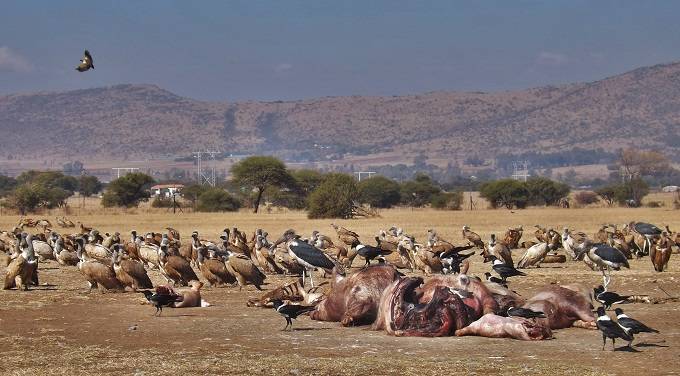Vultures: The mysterious lives of mythical birds

Merlyn Nkomo
African cultures differ in their ways of doing things, societal norms, religious beliefs and rituals.
However, most, if not all revere vultures as a special group of birds, the birds of the gods.
Birds are important in African culture and cosmology (religious belief system). They represent a state of spiritual incarnation. Vultures, with their way of mysterious living, earned themselves a level of reverence and importance like no other.
Vultures are very big birds, they are some of the heaviest flying birds in their guild like the Andean Condor, which is found in South America and weighs up to 15kgs. They generally avoid human habitations and therefore will not be a common bird to see in your backyard garden.
This means that the average person has never seen a vulture and has no idea of how they live as compared to other more charismatic animals like elephants and lions. Vultures also range very wide, this means that they use up very huge spaces as areas to live in and forage for food regularly. Because of this, a vulture can be in Namibia in the morning and South Africa in the afternoon looking for food, and in just a week, a very adventurous vulture may have traversed the whole Sadc region.
As a result, vultures have no borders and their survival is dependent on the attitudes of all the people living across the borders they range in and call home.
Sadly, vultures are misunderstood birds as they are mysterious and not the most charismatic or good looking of the feathered club. To fall in love with them, you need to take time to study them, it is not a rushed loved or love at first sight but a steady love that goes feather deep. There has not been a better time than now to take interest in and love vultures.
This is because of all 23 species of vulture on the planet today, 16 are in danger of extinction and they could be history like the dinosaurs without you having known about them. Of that number, Africa has the most diversity having up to 11 species and nine being found in Southern Africa.
This means that we have the highest diversity to appreciate in the entire world, but the rest of the world knows and appreciates it more than we do. It is important that we change before they are all history.
In Africa today, vultures are faced with many threats to their populations. In Zimbabwe, one of the leading threats is intentional and unintentional poisoning done by poachers and some farmers trying to bait problem animals that prey on their livestock.
Commercialisation of traditional healing and divination also has become a major concern as poachers now trade in vulture parts for traditional medicines. To an African mind, the peculiar abilities of an animal or plant are spiritual and inherent in all its physical form and can be transferred to a human through possession or use of them.
This presents a big challenge to vultures and conservationists trying to protect them, the claims for clairvoyance are scientifically unfounded and faith-based, they stem from a misunderstanding of the ecology of vultures and how they locate food when they are foraging.
Another major threat in Africa today is power lines. Much of Africa still does not have a dense electricity network. Most power lines were designed without the consideration of vultures and other big birds. As a result, these big birds get electrocuted in their numbers on these unsafe structures or collide with the cables as they fly by.
Habitat loss is a major threat too. I was in the Midlands in July for a survey, and everywhere we stopped one could hear the sound of an axe. This was very disheartening.
Almost all vultures nest on trees (except colonial cliff nesting Cape Vultures) and are dependent on big mother trees as not only nesting but vantage roosting points. Deforestation not only makes the habitat unsuitable for them but also causes them to use unsafe structures like power lines for nesting and roosting.
A lot of reforms need to be made for effective vulture conservation, in fact for effective wildlife conservation in Zimbabwe and it all starts with educating ourselves on the importance of our biodiversity because only with our changed attitudes can we petition our leaders and authorities to effectively protect our natural resources.
In the case of our natural resources, ignorance is not bliss. It can mean devastation and poverty for our nation. Real knowledge is the pursuit to knowing the extent of one’s ignorance. The world recently commemorated International Vulture Awareness Day and a seminar was held at the Natural History Museum where experts in the field shared knowledge and current information on the work they are doing in conserving Zimbabwean vultures.
Running under the theme, “Landscapes for Conservation”, the seminar discussed the connections and importance of land management in conserving vultures. Our actions as humans, even the simplest ones, have an impact on nature especially when it comes to what we do to the land as we share this finite resource with all wildlife.
Interesting facts
· Vultures can live up to 70 years
· Vultures are monogamous and usually faithful to one partner for life
· They lay one egg per year
· They do not kill prey but only scavenge
· Some species have wingspans over three metres wide.











Comments